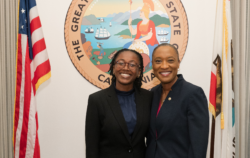
Ubben Posse Fellow Interviews: David Ricks
The Jeff Ubben Posse Fellows Program awards five exceptional Posse Scholars $10,000 each and the chance to spend 4-6 weeks during the summer shadowing and learning from a major industry leader. The interview below with David Ricks, chairman and CEO of Eli Lilly and Company, was conducted by Posse Scholar Izabelle Fernandez, now in her junior year at Wellesley College, who worked with David Ricks as a 2019 Jeff Ubben Posse Fellow. The conversation has been edited and condensed
IZABELLE: Let’s start with your childhood. What was it like?
DAVID RICKS: I grew up in the East Bay area of California, and I had a nice childhood. I was lucky. I got to grow up in a melting pot and be around kids from lots of backgrounds, and my parents were also very big on global travel. My siblings and I were able to live abroad, so that was a helpful orientation to thinking about the world.
It’s great that you were exposed to so much diversity at such a young age. How has that shaped how you value diversity in the workplace?
I think it sounds like a simple thing—to be genuinely comfortable and interested in the cultures of some of the places where we do business. But there are some people who haven’t had that orientation. They’re always looking for differences instead of looking at those things as innovations.
And I think that’s the gift that my parents gave me. They showed me that there is goodness in difference.
That actually brings up something Posse Scholars always talk about. The idea that problems arise in the workplace when conversations that are important to have are not being had because they are difficult to talk about.
What is a conversation you think needs to be had either at Eli Lilly or within the pharmaceutical industry?
“The status quo will always be the status quo unless some force moves it.”
The first order piece is, “Why should we change?” The status quo will always be the status quo unless some force moves it. And the status quo for corporate America as it relates to diversity and inclusion is no longer acceptable.
For us at Lilly, there’s a lot of reason to change.
Talent. If you start with the assumption that my future workforce profile will look like my current workforce profile, you’re excluding huge pools of talent. And my goal is to have the best people working here, so why would I want to exclude anyone?
Innovation. New ideas only come from different ideas, so we need more diversity—in disciplines, backgrounds, et cetera—to be more innovative.
And connecting with the market. The future is already going to be dramatically more diverse, so having people who can understand the firsthand experience of the patients we serve allows us to better connect them with medicines.
What a great leadership lesson: the value of diversity for effective business leadership. Amazing. Any other leadership lessons?
Nobody tells you this, but at some point, when you have a big organization, you need to lead by indirect example. That’s a big shift for people to realize, that what you do every day actually doesn’t matter that much because most people can’t see it.
What you model doing—the shadow you cast—matters, because that’s what people think you’re doing. I have to think about “How do people see Dave as the CEO?” I have to manage people’s public perceptions of me.
Simple things like, “How does he handle with bad news? Does he care about this place? Does he walk the talk?” For example, when I was the head of Lilly China and I didn’t speak any Chinese, I would have to communicate with actions. My first day there, I met with customers and also met the entire leadership team instead of just a subset—because no favorites. These things are important.
“New ideas only come from different ideas, so we need more diversity—in disciplines, backgrounds, et cetera—to be more innovative.”
What 10,000 people see is what they’ll think. People will mimic this, and what you care about (and seem to be caring about) can affect people in a positive way. This is definitely a tool to help bring the organization forward.
And by the time you’re nearing the end of your time as Lilly’s CEO—the next successor has been named, etc.—how will you gauge your success as the CEO?
First and foremost, I’ll know I did a good job as CEO because we found a successor who can do the job better than me. Every CEO should say that because the idea is that you’re advancing the organization. And not better as in a better person, but better in that moment than you could be, because you’re either out of ideas or they have skills that are more suited to the future.
And any advice for newly graduated college students entering the workforce?
Have you seen that movie with Jim Carrey where he just says yes to everything? Do that! Have a sense of adventure! Move around, and don’t be afraid to change. I think taking a “Just say yes” approach to many things professionally can be good. You never know where you’ll end up.
Read More:
Ubben Posse Fellow Interviews: Tim Shriver
Ubben Posse Fellow Interviews: Oskar Eustis
Ubben Posse Fellow Interviews: Jenny Rickard
Meet the 2019 Jeff Ubben Posse Fellows.

